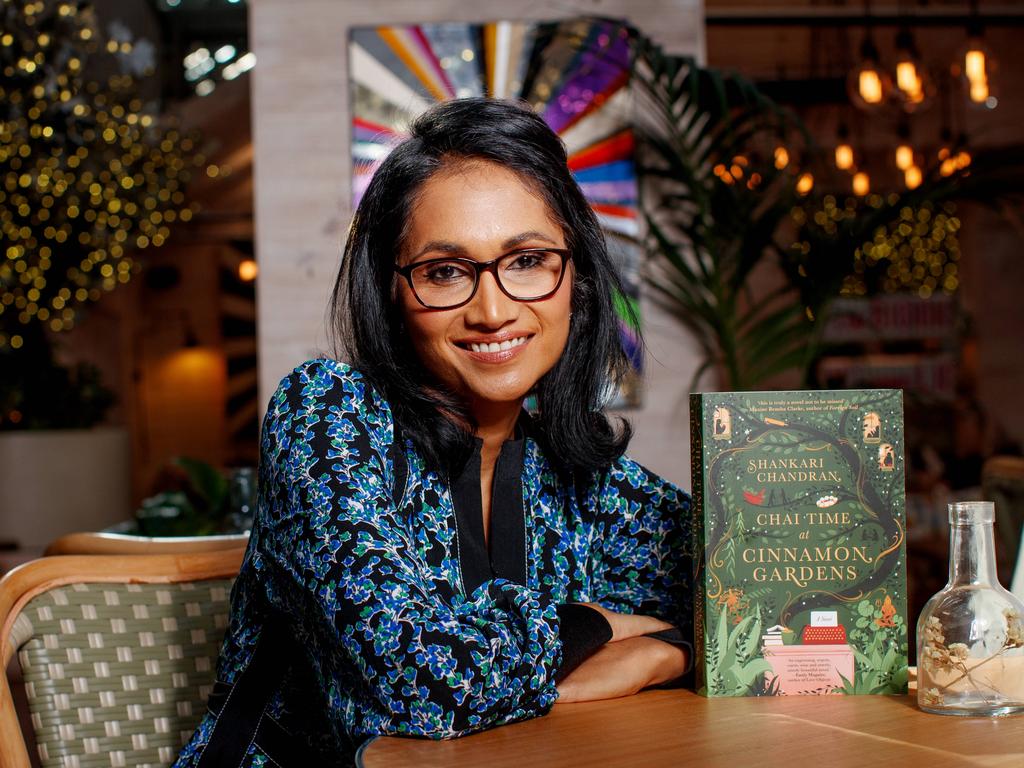Shankari Chandran’s Chai Time at Cinnamon Gardens wins Miles Franklin award
Sri Lankan Australian writer Shankari Chandran wins the Miles Franklin award with a book about the immigrant experience and the beauty and brutality of her ancestral homeland.

To win the Miles Franklin would for many Australian writers be a dream come true.
And when the dream does become reality?
“I had to get them to tell me four times,” said Shankari Chandran, who on Tuesday evening was named winner of the 2023 prize for her novel Chai Time at Cinnamon Gardens (Ultimo Press).
“Richard Neville from the Mitchell Library at the NSW State Library called and said ‘I’m delighted to tell you that you’ve won the Miles Franklin Literary Award’. And I said ‘Sorry?’ And he said ‘I’m delighted to tell you you’ve won the Miles Franklin award’. And I said ‘Sorry?’ And I kept saying ‘Sorry, could you just repeat that one more time?’ Four times he had to repeat himself because my brain was just not absorbing it.
“I followed the prize for years, and to be considered worthy, alongside Australia’s most accomplished writers, how extraordinary. And then I thought, ridiculous.”
Not at all: the judges adored Chandran’s novel, which draws on her Sri Lankan heritage, the internal strife that has engulfed her ancestral home and the immigrant experience.
Chandran is well-known to readers of The Australian, being one of the first writers asked to take part in the “Oh, Matilda Who Bloody Killed Her?” challenge in 2021, when leading Australian writers each contributed a chapter to a novel that evolved over the summer. She also contributed a first-class Sri Lankan omelette recipe to a cookbook rolled out in the pages of The Australian over the summer of 2022.
Now she’s won the Miles Franklin, arguably Australia’s most important prize, established by the will of Stella Miles Franklin, who wrote My Brilliant Career, and supported by the trustees, Perpetual. It is open to everyone, regardless of age or gender, so long as they are writing of “Australian life in any of its phases”.
Chandran is of Tamil descent, and her book is set in a nursing home called Cinnamon Gardens, owned by a Sri Lankan family in the fictional Sydney suburb of Westgrove.
The novel was reviewed in The Australian by Emma Harcourt, who praised the way Chandran handled beauty and brutality, adding “This is an Australian story of dispossession and race; Chandran is an excellent storyteller”.
Chandran said she had always wanted to be writer but like many, had a back-up plan. She’s a lawyer. She also has four children. She was raised mainly in Canberra, with both her parents doctors who came to Australia after fleeing Sri Lanka, ahead of the civil war.
“You could see where the country was going. And so people were trying very hard to leave,” she said. “It was a tumultuous and difficult time where the persecution of Tamil people was escalating, and ultimately culminated in violence in 1983.
“They were fortunate enough to be able to leave because they were educated. Ours was one of the first families to migrate to Canberra from Sri Lanka in the 1970s.
“It was a very, very small community so they really had to learn to navigate a new culture and a country that wasn’t necessarily ready for them. They made good friends and built careers.”
She wanted to tell a story about the land from where her parents had been forced to flee, and the land that they came to call home.
“We have large, extended families, and we would go together every summer as children and live with my grandparents, so I have very strong memories of being in Colombo with my grandmother, and grandfather,” she said.
“My novels draw heavily on childhood memories and more importantly on the collective memories of generations of my family.”
Sri Lankan writers are having a moment: Chandran’s compatriot Shehan Karunatilaka won this year’s Booker Prize for The Seven Moons of Maali Almedia.
He, of course, was following in the footsteps of Michael Ondaatje, who won the Booker for The English Patient.
“I’m very fortunate that the world is finally interested in stories about this small and relatively insignificant island. It is often assumed to be a paradise for cricket players, beautiful beaches, and tea,” Chandran said.
“That’s how the world thinks of us, and I think that it is through the hard work of everybody from human rights activists in Sri Lanka to the writers in Sri Lanka and outside of Sri Lanka, that other stories about Sri Lanka can be told.”
The judges praised Chandran’s skill in recounting “a solemn history, largely through a cast of squabbling, endearing elders, and invites us to open our hearts and minds.”
Chandran receives $60,000 in prize money.
The 2023 judging panel comprised author and literary critic Bernadette Brennan; literary scholar and translator Mridula Nath Chakraborty; book critic James Ley; Mitchell Librarian Richard Neville; and author and editor Elfie Shiosaki.







To join the conversation, please log in. Don't have an account? Register
Join the conversation, you are commenting as Logout